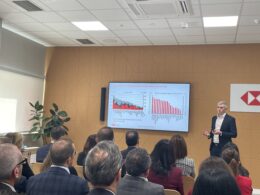MAPFRE has surpassed its commitment to recycling 90% of the waste managed by the Group. It is developing a ‘Zero Waste’ project in its offices in Spain, Mexico, Brazil, and Puerto Rico to minimize waste generation. It also promotes sustainability in repair shops in Spain, Portugal, France, and Benelux through the Move2Green certification, which 535 repair shops have already signed on to.
MAPFRE has taken part in Global Recycling Day, which was celebrated on Saturday, May 17, where it highlighted its commitment to sustainability and the circular economy, one of the main global challenges.
Last year, it managed a total of 5,017 tons of waste globally, of which 4,816 (96%) underwent recovery processes, i.e. recovery, recycling, or energy production, which represents 50% more than last year and six points ahead of the annual objective set for 2030.
Here, CESVIMAP’s work stands out. This is MAPFRE’s R&D center, which in 2024 recovered a total of 676 tons of parts from damaged vehicles through its Authorized Treatment Center CESVIrecambios, which can be reused in other vehicles. These spare parts are the product of the treatment and decontamination of 2,175 vehicles in Spain, both combustion and electric, 13% more than in 2023. Since its creation in 2004, CESVIrecambios has handled over 53,000 vehicles and is a leader in how cars can be sustainably decommissioned. This company reuses raw materials, such as plastic, aluminum, bodywork, and glass, and provides a second life to the pieces, including batteries from decommissioned electric vehicles. It uses these batteries to store part of the energy from the self-consumption photovoltaic plants at both work centers, which in 2024 produced 244 MWh, almost 80% more than in 2023.
CESVIMAP has also conducted crash tests on more than 800 vehicles (passenger cars, vans, motorcycles, and electric scooters) to assess their repairability and safety in the event of a claim, help manufacturers assess the damage and improve design and safety, and identify methods of sustainable repair to avoid generating waste. The company also promotes the sustainability of repair shops in Spain, Portugal, France, England, and Benelux through the Move2Green certification, which 535 workshops have already signed on to.
MAPFRE aims to become a carbon-neutral company by 2030. Such a commitment promotes responsible resource consumption, as well as waste reduction, reuse, and recycling, among other measures.
In 2023, thanks to the Eco-RAEE project, the Group reused a total of 5 tons of IT equipment through donation. In Spain, 24% of the total IT equipment we manage has been repaired, preventing 56 tCO2e from being released into the atmosphere and 13,500 m³ of water from being consumed.
Two other initiatives have played an important role in reducing waste: signing documents using biometric electronic signature, which has prevented the consumption of 360 tons of paper, and, as a result, the release of 483 tCO2e in Spain and Portugal; and the “Zero Waste” project, the objective of which is to minimize the generation of waste and which the Group has already implemented in seven buildings in Spain, Brazil, and Mexico. In 2025, this management model will be expanded to other facilities in Spain, Puerto Rico, and Portugal.
In Malta, MAPFRE is targeting carbon neutral scope 1 and 2 by end of 2025 and by 2030 for MAPFRE global. Leading in ethical business, inclusion and climate action, MAPFRE Malta is also participating in projects including Green and Blue infrastructure, based on nature-based solutions.
MAPFRE Malta has implemented various sustainability actions such as bonuses linked to carbon reduction, inclusive employment of foreign nationals and special needs individuals, solar panels and smart energy controls, an electric/hybrid car policy, remote working to cut emissions, facility upgrades for energy efficiency, 80% of investments supporting ESG principles, and a 0% gender pay gap.













